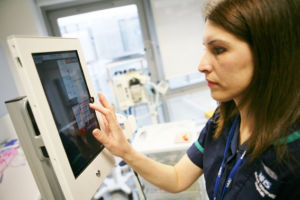 Drayson Technologies Limited has announced a five-year Strategic Research Agreement (SRA) with the University of Oxford and Oxford University Hospitals NHS Foundation Trust (OUH) in the field of digital health.
Drayson Technologies Limited has announced a five-year Strategic Research Agreement (SRA) with the University of Oxford and Oxford University Hospitals NHS Foundation Trust (OUH) in the field of digital health.
Millions of NHS patients are set to benefit from the commercialisation of cutting edge technologies invented in Oxford, following the landmark licensing deal between Drayson Technologies and a partnership between the University and OUH, who developed and trialled the technologies in the Oxford Biomedical Research Centre (BRC), funded by the National Institute for Health Research (NIHR).
Underpinned by the University’s academic research excellence, engineering expertise and the Trust’s clinical validation, the ground-breaking SRA will create a pathway for the production of world-class digital health products, commercialised globally by Drayson Technologies.
The SRA ensures that the technologies can be commercialised so that they can bring benefit to patients across the NHS and overseas, but it also means that some of the profits will come back into the NHS Trust and University of Oxford to benefit more patients and fund more research – exactly the aim and ambition of the NIHR when it funded the BRCs across the country.
Drayson Technologies will sponsor significant further research and clinical validation of new digital health products over the next five years.
The University of Oxford and OUH will receive in aggregate £5m worth of equity in Drayson Technologies as part of the Series C funding round. The SRA builds on the exclusive licensing agreement between Drayson Technologies and Oxford University for the SEND, GDm-Health and EDGE digital health products, which was announced earlier this year.
The SRA provides Drayson Technologies with an option to license IP developed by Professor Lionel Tarassenko, Oxford BRC theme lead for Technology and Digital Health, and certain collaborators in the field of digital health.
To support the SRA, Drayson Technologies has raised a £10m Series C investment led by investor Woodford Investment Management. Drayson Technologies has raised over £41m to date and this most recent round of investment will enable it to continue its mission to understand the health of an individual in the context of their environment and generate actionable information and discoveries that improve health and reduce healthcare costs.
Lord Drayson, Chairman and CEO, Drayson Technologies, said: “Chronic disease affects the lives of millions of people as well as accounting for around 70 per cent of NHS costs. Digital health technologies offer the potential to make a huge difference for these people and save money for the NHS. This highly innovative partnership will ensure that there is a pathway from invention to commercialisation for digital health products created in Oxford that will deliver benefits to patients and reinvestment back into the University and the NHS Trust.”
Prof Lionel Tarassenko, Head of the Unoversity of Oxford’s Department of Engineering Science and Oxford BRC theme lead for Technology and Digital Health, whose research group developed the digital health products in partnership with OUH, said: “Our work with wearables, smart devices, and machine learning algorithms has enabled the delivery of real-time, personalised healthcare to patients where it is most needed, from the hospital to the home. The partnership with Drayson Technologies gives us a unique opportunity to accelerate the development and deployment of these digital health products across a wide spectrum of conditions.”
Peter Knight, Chief Information and Digital Officer at Oxford University Hospitals NHS Foundation Trust, said: “I am delighted that the Trust and the University of Oxford, working in partnership, have reached this agreement with Drayson Technologies. Working together will allow us to bring technologies that we invent and develop together to our patients faster. We will also be able to reinvest royalties from the results of research and development created in the partnership of the University and NHS back into our services for the benefit of our patients.”
Dr Paul Ashley, Head of Technology Transfer, Life Sciences at Oxford University Innovation, said: “Digital health has enormous potential to generate patient benefit and economic savings throughout the NHS and beyond. This Strategic agreement between the University and Drayson Technologies will allow us to build on the existing licensing agreements between Drayson Technologies and Oxford University Innovation. Combining the innovation and insight of the Department of Engineering Science and the Trust with the resources and expertise of Drayson Technologies provides great opportunity for new ground-breaking technologies that could have a significant impact on healthcare around the world.”